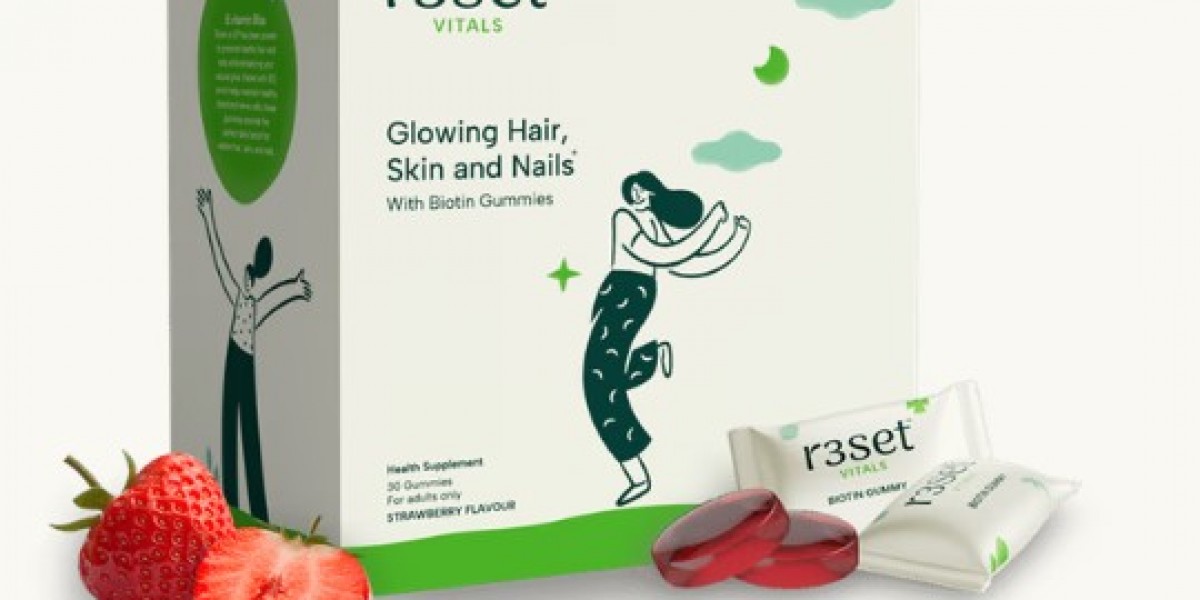Hair is more than just aesthetics—it’s tied to confidence, self-expression, and how we feel about ourselves. With rising stress levels, nutritional gaps, and lifestyle challenges, hair thinning and slow growth are common complaints. Enter hair growth gummies—colorful, chewy supplements marketed as an easy way to boost hair health. But do they actually work, and are they safe? Let’s break it down.
What Are Hair Growth Gummies?
Hair growth gummies are chewable dietary supplements formulated with vitamins, minerals, and plant extracts that support healthy hair. Unlike traditional tablets or capsules, gummies are flavored and easy to consume, which makes them especially popular among people who dislike swallowing pills.
Most hair growth gummies include a mix of:
Biotin (Vitamin B7): The star ingredient, linked to keratin production and stronger hair.
Vitamin A, C, D, and E: For scalp health, collagen production, and antioxidant protection.
B-Complex Vitamins: Supporting red blood cell formation and nutrient delivery to hair follicles.
Zinc & Iron: Essential minerals for reducing hair fall.
Collagen & Keratin Extracts (in some brands): Building blocks of hair structure.
Herbal Extracts (like Amla, Bamboo, or Horsetail): Claimed to strengthen hair naturally.
How Do Hair Growth Gummies Work?
The logic is simple: hair follicles need nutrients to grow. If your body lacks key vitamins and minerals, it often shows up first in hair and skin health. Hair growth gummies aim to fill those gaps by delivering targeted nutrition in a tasty format.
When taken consistently, they may:
Promote Keratin Production: Biotin and zinc aid in forming keratin, the protein that makes up hair strands.
Improve Blood Circulation to the Scalp: B-vitamins and iron help oxygenate the follicles.
Reduce Breakage: Antioxidants like vitamin C and E fight oxidative stress that weakens hair.
Support Hormonal Balance: Certain ingredients, like vitamin D and zinc, can help regulate hair cycles.
However, it’s important to note that hair growth gummies are not magic pills. If hair loss is due to genetics, thyroid imbalance, or medical conditions, gummies alone won’t reverse it.
Benefits of Hair Growth Gummies
Here’s why many people turn to them:
1. Convenient Nutrition
They’re chewable, tasty, and travel-friendly. This makes it easier to stick to a daily routine compared to swallowing large capsules.
2. May Reduce Hair Fall
Consistent intake of biotin, iron, and zinc can reduce hair shedding caused by nutritional deficiencies.
3. Promotes Stronger, Shinier Hair
Vitamins A, C, and E support scalp health and collagen synthesis, which can make hair more resilient and lustrous.
4. Supports Nail and Skin Health
Since these nutrients also affect skin and nails, users often report clearer skin and stronger nails as a bonus.
5. Helps in Stress-Related Hair Issues
Stress is a major contributor to hair thinning. B-vitamins help regulate stress hormones, indirectly supporting healthier hair.
Side Effects of Hair Growth Gummies
Like any supplement, they’re not risk-free. Here are possible downsides:
1. Digestive Discomfort
Some people experience bloating, nausea, or stomach cramps when taking supplements, especially if taken in excess.
2. Overconsumption Risks
Since gummies taste like candy, it’s easy to overeat them. Too much vitamin A, D, or zinc can be toxic, leading to headaches, fatigue, or even liver strain.
3. Not Suitable for Everyone
Pregnant women, people on medication, or those with underlying health conditions should consult a doctor before starting.
4. May Cause Acne
Excessive biotin intake has been linked to breakouts in some individuals, as it can interfere with vitamin B5 absorption.
5. Sugar Content
Many gummies contain added sugar, which could be a drawback if you’re monitoring calorie or sugar intake.
Do Hair Growth Gummies Really Work?
The short answer: they can help, but only if deficiencies are the root cause of your hair problems.
If you’re lacking vitamins or minerals, hair growth gummies may fill the gap and improve growth over time.
If your hair loss is hormonal (like PCOS), medical (thyroid issues), or genetic (pattern baldness), gummies won’t be a miracle solution.
Clinical research on biotin deficiency shows improvement in hair and nail growth when supplementation is provided. However, for people with no deficiency, results are usually minimal. Most experts agree that diet, lifestyle, and underlying health conditions play a much bigger role.
Tips for Choosing the Right Hair Growth Gummies
Not all gummies are created equal. Here’s what to check:
Ingredients List: Look for biotin (5,000–10,000 mcg), zinc, vitamin D, and iron if you’re deficient.
No Excess Sugar: Opt for low-sugar or sugar-free formulas.
Third-Party Tested: Choose brands with transparency and quality testing.
Vegan/Allergen-Free Options: If you have dietary restrictions.
Check Dosage: Avoid excessively high doses that exceed daily recommended limits.
Natural Alternatives to Gummies
Supplements can help, but natural sources are always better. Instead of relying solely on hair growth gummies, try incorporating these foods:
Eggs and Nuts: Great for biotin and protein.
Spinach and Lentils: Rich in iron and folate.
Citrus Fruits: Boost vitamin C for collagen.
Fatty Fish: Omega-3s for scalp nourishment.
Seeds (Pumpkin, Sunflower): Provide zinc and vitamin E.
Pairing a nutrient-rich diet with stress management, proper sleep, and scalp care gives the best long-term results.
Final Thoughts
So, do hair growth gummies work? Yes—but only under certain conditions. They’re most effective for people dealing with nutrient gaps rather than medical or genetic causes of hair loss. They’re convenient, tasty, and may support overall hair strength, shine, and thickness. On the flip side, overconsumption and unrealistic expectations are common pitfalls.








